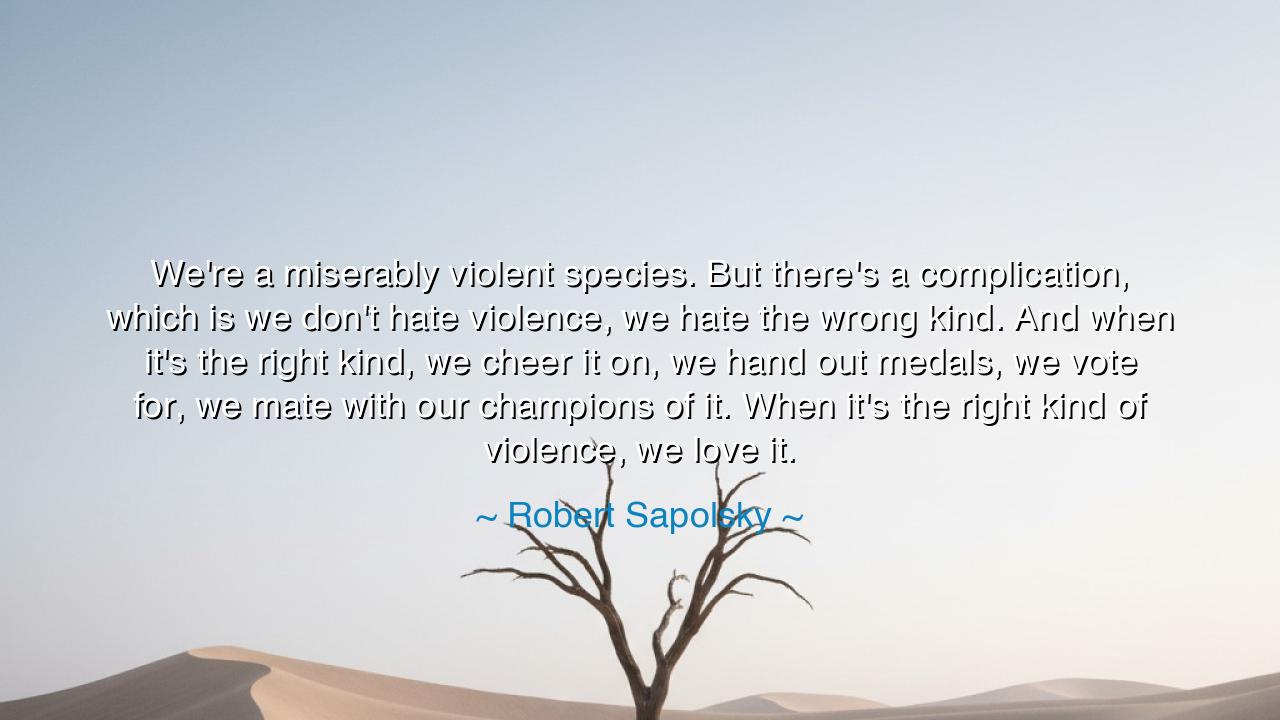
We're a miserably violent species. But there's a complication
We're a miserably violent species. But there's a complication, which is we don't hate violence, we hate the wrong kind. And when it's the right kind, we cheer it on, we hand out medals, we vote for, we mate with our champions of it. When it's the right kind of violence, we love it.






Hear now the unsettling wisdom of Robert Sapolsky, a scholar of the human spirit and the beast within, who spoke thus: “We’re a miserably violent species. But there’s a complication, which is we don’t hate violence, we hate the wrong kind. And when it’s the right kind, we cheer it on, we hand out medals, we vote for, we mate with our champions of it. When it’s the right kind of violence, we love it.” In this sharp and burning truth, Sapolsky holds a mirror to the heart of humanity, and in that reflection we see both our glory and our shame. For though we dream of peace and speak of virtue, violence — when clothed in righteousness or victory — has ever been our secret idol.
Sapolsky is a man who has spent his life studying the roots of behavior — in the jungles among baboons, in the laboratories of thought, and in the cities of man. He knows what the ancients feared to admit: that the line between justice and cruelty, between valor and savagery, runs not through nations or tribes, but through every human heart. His words do not accuse for the sake of despair; they reveal the paradox that has shaped our history. For while we condemn bloodshed in the name of evil, we glorify it in the name of honor. We decry the murder of the innocent, yet celebrate the slaying of the enemy. The same hand that builds monuments to peace also forges the sword.
From the dawn of civilization, humankind has wrestled with this contradiction. When Hector stood before the gates of Troy, his sword flashing beneath the sun, his people wept and prayed for his victory. To them, his violence was holy, a defense of home and kin. But to the Greeks, led by Achilles, he was the enemy — and his death was celebrated with song and sacrifice. Thus, both sides wept for their own and rejoiced in the suffering of others, each convinced that their violence was righteous. Such has been the pattern of our species: to sanctify our aggression when it serves us and condemn it when it wounds us.
Sapolsky’s words cut through the illusions of morality to remind us that violence itself is not foreign to us — it is familiar, seductive, and deeply woven into our instincts. We dress it in noble causes: “freedom,” “justice,” “honor,” “protection.” We raise heroes from its ashes and carve their names in stone. The soldier who kills for his homeland is honored; the rebel who kills against it is cursed. Yet, beneath these shifting banners lies the same ancient impulse — the primal need to conquer, to protect, to dominate. Sapolsky’s insight forces us to ask not whether violence can be justified, but why we are so eager to justify it.
And yet, there is a deeper lesson here — for his words are not a curse upon humanity, but a call to self-awareness. If we can understand that our love of “righteous violence” is born of instinct and not of truth, we can begin to rise above it. History shows glimmers of this awakening. When Mahatma Gandhi raised no sword against the British Empire, he challenged not only his oppressors but the very assumption that power must come through pain. His nonviolence was not weakness; it was mastery — the triumph of mind over impulse, spirit over instinct. Through such examples, we glimpse the possibility that we may yet evolve beyond our contradictions.
But Sapolsky would warn us: the path to peace is not through denial, but through understanding our nature. To pretend that violence can be erased is folly; to learn to master it is wisdom. We must recognize the thrill that stirs within us when the “right” side wins, the pride that swells at the sight of victory — and confront it with honesty. For until we see that our love of violence is not virtue but vanity, we will continue to build monuments to destruction and call them triumphs of civilization.
So let this be your teaching, O children of the future: know the beast that dwells within, and teach it compassion. Question the violence you applaud, whether in the arena, on the battlefield, or in the words you speak. Seek not to destroy the warrior spirit, but to transform it — from the urge to conquer others into the strength to conquer oneself. For when courage is joined with mercy, when power is guided by understanding, then humanity may at last find peace not in victory, but in wisdom.
Therefore remember Sapolsky’s words — not as despair, but as warning. We are a violent species, yes, but we are also a reflective one. And when we learn to see that love of the “right kind of violence” is still love of violence, we begin to awaken from the dream of righteous wrath. Let us use our strength not to glorify destruction, but to defend life; not to seek vengeance, but to build justice. For only then will the medals of war become relics of memory, and the true triumph of our species will be this: that we learned at last to master the fire within.






AAdministratorAdministrator
Welcome, honored guests. Please leave a comment, we will respond soon